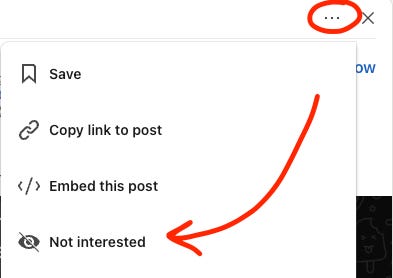Things you SHOULDN'T do on LinkedIn ❌
They can ruin your career
LinkedIn is probably the social network where you need to pay more attention than ever to your actions.
The reach this platform has achieved, and the variety of content on it, have given people the illusion that its nature is comparable to other platforms. As a result, many users make the mistake of behaving as if they were on other social networks.
Let’s pause for a second and think about what each platform represents:
What does Instagram represent for you? Maybe your status?
What does Youtube represent for you? Perhaps your entertainment?
What does Reddit represent for you? Could be your thoughts?
Now, what does LinkedIn represent for you?
I hope you agree with me that this platform represents your professional status, or your career, if you prefer.
Once you define the purpose of a platform, you automatically define which actions are compatible and which are not.
Some are pretty obvious. Others, less so.
Today, I want to share a few behaviors I’ve observed that I strongly recommend avoiding.
1️⃣ Flirting
Pretty obvious, right? And yet, I still see people using the chat to reach out with topics completely unrelated to work.
Clearly, this is not the place to approach people in that way. And worst of all, you should never underestimate how small and well-connected professional networks can be.
This means that any inappropriate behavior—even in private—can quickly reach the eyes of someone who works at a company you’d like to join.
Trust me, this is the fastest way to say goodbye to that opportunity.
2️⃣ Ignoring job proposals
Since I started working as a Software Engineer, I’ve received messages every single day with job offers.
Usually, they’re messages asking if I’m open to interviews, and often, the roles don’t interest me at all.
Still, I’ve always replied to every single message.
It costs you nothing to say:
“Hey, thanks for the interest, but I’m not currently looking for new opportunities. Good luck with your search!”
Here’s why you should always respond:
You never know if that seemingly uninteresting opportunity hides more than it seems.
The same person might come back tomorrow with a better offer.
That recruiter might move to a company you actually like—people remember kindness, but they remember rudeness even more.
HR professionals often talk to each other—even across companies. If you’re known for not replying, some may stop trying.
Even if the message is clearly copy-pasted, replying is a sign of respect for the person’s effort—and a reminder of the privilege we have in this industry to be so in demand.
In short? The more you ignore messages, the fewer you’ll receive over time. The more you respond, the more will come your way.
3️⃣ Following content that bothers you
This is a classic mistake I see from people who hate LinkedIn: they fill their feed with content and contacts they dislike.
They complain that everything is fake or that people post ridiculous things.
But they don’t do anything to change it.
There is a solution.
You should treat your feed like your baby: carefully curate it as long as you’re using it!
There’s a feature I love, designed exactly for this:
Every time you see annoying content, you can mark it as “Not interesting” and tell LinkedIn not to show you similar posts again. And you you can even specify if it’s the topic or the author you want to avoid.
Understand how powerful that is?
You should take an active role in maintaining your feed. Keep it clean. This directly affects your engagement, and without engagement, you’ll struggle to grow your professional presence online.
4️⃣ Posting unpleasant comments
This often goes hand-in-hand with the point above.
If your feed is full of annoying content, your frustration may drive you to post rude or unpleasant comments.
Needless to say, this kind of behavior can damage your reputation.
It’s crucial that your comments remain constructive.
I’m not saying your company—or future interviewer—is constantly watching you.
But trust me, negativity stands out. And once it does, it’s hard to forget.
5️⃣ Trying to be a comedian
On other platforms, humor, sarcasm, and jokes are common—and that’s totally fine.
LinkedIn even added a “laugh” reaction, but in my opinion, this is a bit controversial.
Dropping the occasional lighthearted comment that matches the spirit of a post can show your humanity (you’re not a robot, after all).
But going all in on memes, constant jokes, or sarcasm?
To me, that signals you're not taking your career seriously—and maybe not very passionate about your work either.
You have plenty of tools and platforms to express your humor. Use LinkedIn to go deep on topics related to your job.
6️⃣ Using LinkedIn only when you need a job
A major misconception: that LinkedIn is only for job hunting.
So your usage graph looks like this:
📈 You’re active when applying.
📉 You disappear once hired.
📈 You return a couple of years later when you’re job hunting again.
Sure, you can use it like that. But doing so shrinks your opportunities by 10x. Which is ironic, considering your goal is to find opportunities.
What’s a healthier way to use LinkedIn?
✅ Keep your feed clean and relevant.
✅ Enjoy reading news, insights, and posts about technology and software practices.
✅ Reduce time on other social platforms, and balance professional content with personal interests elsewhere.


